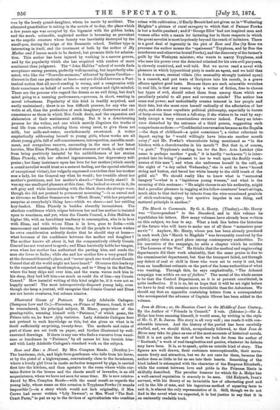Rose and Rue: a Novel. By Mrs. Compton Reade. (Bentley.)—
The handsome, rich, and high-born gentleman who falls from hid horse, or by the pistol of a highwayman, conveniently close to the farmhouse, where a lovely girl lives in rustic seclusion tempered by pigs, is carried first into the kitchen, and then upstairs to the room where white cur- tains flutter in the breeze and the sheets smell of lavender, is an old acquaintance, whom we have not seen for some time. He is now reintro- duced by Mrs. Compton Reade—with the usual result as regards the young lady, whose name on this occasion is Tryphena Fowke (it sounds impossible 1)—in a story which would not lack originality, if Mrs. Crowe had never written "Lily Dawson"; or Mrs. Wood "The Red- Court Farm," to put us up to the devices of agriculturists who combine crime with cultivation ; if Emily Brontë had not given us in " Wuthering Heights" a picture of rural savagery to which that of Farmer Fowke is but a feeble pendant ; and if' George Eliot' had not inspired men and women alike with a mania for imitating her in those respects in which the great novelist is most hopelessly beyond the reach of imitators. There is a good deal of ingenuity in the plot of Rose and Rue (by Rose we presume the author means the "opalescent" Tryphena, and by Rue the murderous and otherwise brutal Fowke), and the discovery of the farmer's guilt by the Wesleyan minister, who wants to marry Tryphena, and who uses his power over the detected criminal for his own evil purposes, is cleverly contrived, and well told. But we never read a novel with pleasure in which hypocritical piety is made an agent, and we hold that to dress a mean, sensual villain (the sensuality strongly insisted upon) in a cassock, and put texts of Scripture into his mouth, is a grave offence against good taste. Because there are such miserable wretches in real life, is that any reason why a writer of fiction, free to choose= her types of evil, should select them from among those which are- peculiarly painful to all pure and reverent minds? The author has some real power, and undoubtedly creates interest in her people and their fate, but she must cure herself radically of the affectation of her style, and she must repudiate political philosophy, especially in bursts of forty-seven lines without a full-stop, if she wishes to be read by any- body except a very conscientious reviewer indeed. Fancy an inter- view disturbed by the entrance of a third person, suggesting such comparisons as these :—" Confidential conversation became as the Regalia —the days of childhood—a quiet conscience "; a visitor reluctant to. depart saying he " would willingly have lotos-ate another month away ;" and Mr. Fowke's whereabouts being mentioned as "in the- kitchen with a churchwarden in his month "! But that is, of course, "a goak." Tryphena's making tea for the Rev. Acts Latchet (the name is perhaps another "goak," it is hardly " sarkasum ") is inter- preted into its being " pleasant to her to wait upon the fleshly weak- nesses of this man "; and when she undresses herself in the cold, on the night of "a day called Wednesday," she is said to have "loosed string and button, and bared her white beauty to the chill touch of the gelid air." We should really like to know what is " sorrestraa imagery "—what is a " lapideoua young woman," and what is the meaning of this sentence : " He might choose to air his authority, might• find a peculiar pleasure in tugging at his fellow-creatures' heart-strings, much akin to that derived by infants from the wire-occasioned gambols of stick-embracing apes ; but sportive impulse is one thing, and matured principle is another."


































 Previous page
Previous page